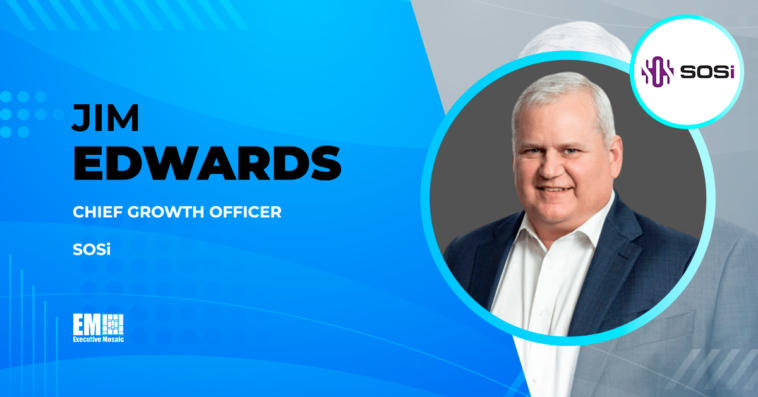The career of Jim Edwards demonstrates unwavering support for the American defense ecosystem and national security. Two-and-a-half decades in the U.S. Army informs his current career in the government contracting world, which has included a pair of separate, sizable runs at SOSi as well as time spent at Peraton (formerly Perspecta) and Amentum (then DynCorp). He has most recently been with SOSi for the last three years and was appointed its chief growth officer in February. In this role he is actively working to expand the company’s presence in the defense, civilian and intelligence markets.
Edwards has a highly informed perspective, honed while performing duties as a senior civilian in the U.S. Army Intelligence and Security Command and as a military analyst for a prominent agency in the Intelligence Community. We sat down with him to talk through the technologies and strategies currently shaping the global intelligence landscape today, as well as his thoughts on the GovCon industry and how it’s shifted over time.
If you’re a GovCon industry member who wants to or already conducts business with the U.S. Intelligence Community, the Potomac Officers Club’s 2024 Intel Summit is a seminal event. Notable speakers will grace the stage from the CIA, the Defense Intelligence Agency, the Office of the Director of National Intelligence and more. Jim Edwards himself will even be moderating a panel discussion! Don’t miss out—register for the Sept. 19 event now!
Which emerging technologies do you anticipate will have the greatest impact on our standing in the great power competition in the next few years?
Jim Edwards: I think progress in artificial intelligence and machine learning, quantum and blockchain will be key determinants in economic competition among the so-called great powers, but the age of drone warfare is clearly upon us in shooting wars. If we fail to adapt quickly and effectively, we are likely to suffer horrendous losses in a military conflict with great, and even not-so-great, powers.
Consider that Ukraine has sunk one-third of Russia’s fleet in the Black Sea while denying Russian naval forces freedom of movement there. That’s an impressive accomplishment for a country with no appreciable navy of its own.
Further, consider how Ukraine is routinely striking Russian energy infrastructure, command and control nodes, transportation systems and military airbases hundreds of miles deep inside Russia with domestically produced unmanned systems. That’s impressive, given Ukraine had no real indigenous drone manufacturing capability two years ago, and they are operating in one of the toughest electronic warfare and air defense environments on the planet.
Our standing in great power competition will be directly related to the extent the U.S. military, homeland security, and law enforcement organizations develop and operationalize drone and counter-drone capabilities. The Department of Defense must procure offensive and defensive drone systems, provide persistent surveillance that enables us to strike adversary targets of our choosing, cultivate techniques that minimize friendly forces’ vulnerability to attacks and hone supporting cyber and EW capabilities.
More importantly, our nation must recognize the threat to domestic infrastructure and take responsible steps to craft policies, allocate resources, and create a coherent framework among national, state, and local entities that enable us to defend against attacks and respond in the event our defenses fail. For example, what agency or group of agencies are postured to credibly defend and respond to attacks against the massive amounts of oil and gas infrastructure easily visible from I-10 near the Texas Gulf Coast?
Open-source intelligence and the need for information sharing between mission partners are on the rise. How is your organization adapting to these needs?
Jim Edwards: I’m proud to say that SOSi has taken a leading role in these areas. Through our wholly owned subsidiary, Exovera, we have nurtured an OSINT capability that empowers language-enabled analysts, data scientists and engineers to collect unique datasets and add analytic insights that are relevant to our customers. Moreover, under our prime Mission Partner Environment contract, we are delivering leading-edge, cloud-based and zero trust-enabled solutions to securely share information with 33 different allied or partner nations. We view the inherent “shareability” of OSINT and the infrastructure to enable secure sharing with partners as critical enablers of the Combined Joint All-Domain Command and Control concept.
How has GovCon changed since you began your career, and what’s your take on the market now?
Jim Edwards: I think the GovCon services market is more competitive than it has ever been, with most customers demanding performance-based approaches that drive down costs, reduce staffing and unlock the industry’s potential for innovation. I especially appreciate our customers who are willing to engage candidly with the industry well in advance of requests for proposals, and I marvel at those who put up walls and are content to solicit proposals that ask for a fixed number of full-time equivalent staff.






